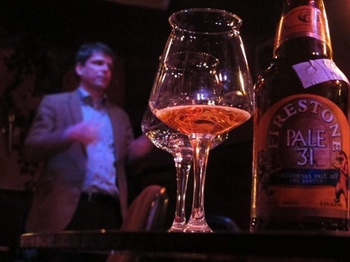
Almost 65 years after Allied planes flew Western supplies into blockaded Berlin, a new American import is arriving by air: craft beer.
The beer is being flown in as part of a new surge of German interest in American brewing, upending a centuries-old relationship in which German beer defined the golden standard for brewing and Americans emulated it.
Now, with craft brewers in the United States capturing an ever-greater share of their home market, they are expanding in Germany as well. German consumers, intrigued by unfamiliar flavors, are purchasing more imported beer and are increasingly copying American efforts with their own small-scale brewing operations.
In the last year in Berlin, high-end U.S. beer — including one from California that is flown over in coolers — has become available in some grocery stores, and several U.S.-style craft breweries have opened. The efforts are aimed at challenging the dominance of plain-old pilsner, the mild lager that dominates more than half of beer sales in Germany. Beer consumption is slipping in Germany, and some brewers say their only salvation lies in fostering a drinking culture less constrained by a 1516 purity law that they say crimps innovation.
“What we’ve found in the United States is this amazing variety of styles and the openness of customers to new things,” said Marc Rauschmann, who is importing beer from California-based Firestone Walker Brewing Co. in airfreighted coolers. Other beer is shipped by sea. “We were really impressed.”
American flavor
Rauschmann has started an aggressive effort to sell imported beer and to brew his own German beer in flavorful styles that are popular among craft brewers in the United States but rare in Germany, such as hoppy ales and zesty lagers.
The turnaround is shaking big German brewers, many of whom like to brag that they are the best in the world. Upstarts are using another b-word, boring, to explain why consumption has been sliding from its 1976 heights. Back then, every person in Germany drank, on average, three liters of beer a week. Now that is down by a third and expected to keep dropping as older, beer-loving customers die away.
But unlike the United States, where in recent years many supermarkets have expanded their beer selection to include dozens of styles from the far reaches of the globe, most German stores have remained resolutely unvaried, almost always offering just a handful of manufacturers and only rarely throwing a non-German beer into the mix.
Now Rauschmann and others are proselytizing, traveling Germany to spread the gospel of unusual tastes. His company, Braufactum, is owned by German beer giant Radeberger, which Rauschmann said was trying to help spark a new beer culture in the country where it has been a major producer since 1872.
For some beer businesspeople, that change cannot happen fast enough.
“The German beer industry has to reinvent itself in a hurry, or it’s going to be a small fraction of what it is now,” said Eric Ottaway, the general manager of Brooklyn Brewery, which has been expanding in Europe and has been exporting its beer to Germany through Braufactum, which sells a 12-ounce bottle of Brooklyn Lager in upscale grocery stores for the equivalent of $4.20 — almost three times its typical American price.





